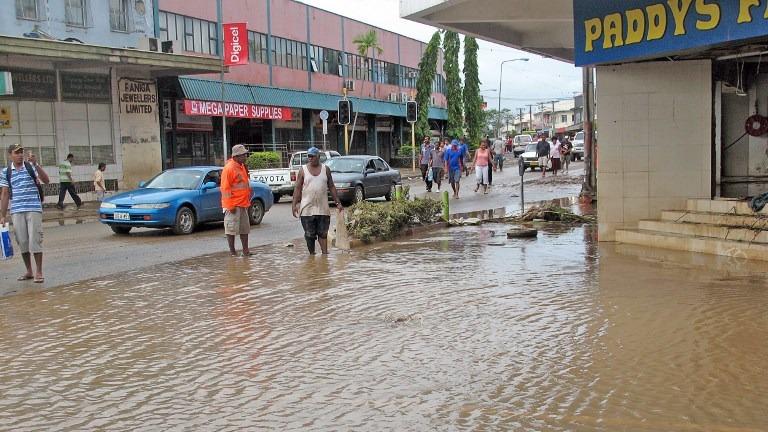 Floodwaters inundate the tourist town of Nadi on the island of Viti Levu on April 2, 2012 as Fiji braced for gale force winds which were expected to intensify into a tropical cyclone. (NEIL SANDS / AFP)
Floodwaters inundate the tourist town of Nadi on the island of Viti Levu on April 2, 2012 as Fiji braced for gale force winds which were expected to intensify into a tropical cyclone. (NEIL SANDS / AFP)
SUVA - Climate change and rising sea levels pose long-term threats to Fiji's low-lying islands, including the need to relocate and deaths during disasters, according to the Asian Development Bank in its latest Pacific Economic Monitor.
READ MORE: Climate change worries Pacific forum
The ADB said these low-lying areas in Fiji will be increasingly susceptible to storm surges and flooding and may eventually become unsuitable for settlement, forcing thousands of people to relocate and resulting in loss of life, reports Fiji Broadcasting Corporation on Friday.
The situation is likely to be aggravated further by an increase in the number and intensity of cyclones, according to ADB's Economic Monitor
ADB's Economic Monitor also stated the situation is likely to be aggravated further by an increase in the number and intensity of cyclones.
Aside from the direct impact on Fiji's population, there will be a recurring threat to the tourism sector, the report showed.
The destruction of business structures and public infrastructure will have serious economic consequences.
Since 2016, four category 5 tropical cyclones have struck Fiji which have resulted in a cumulative damage equivalent to 21.9 percent of gross domestic product.
It is forecast that the damages inflicted by tropical cyclones and floods also translate into an average of 25,700 Fijians who are being pushed into poverty every year, and this could increase to an annual average of 32,400 Fijians forced into poverty by 2050.
ALSO READ: Australia, NZ urged to meet livelihood needs of Pacific Islands states
Extreme temperatures and variations in rainfall will affect agricultural output with serious consequences on food security and on households dependent on agricultural income, the report showed.
Like other Pacific countries, Fiji's health system is also vulnerable to the long-term impact of climate change through various diseases brought about by rising temperatures.
Just recently the ADB had approved 150 million Fijian dollars (around $68 million) in loans to help Fiji recover from the COVID-19 pandemic and build resilience against climate and disaster risks.


